A non-periodical newsletter issued by Technology and Law Community “Masaar” on news and activities related to digital rights in Egypt.
Subscribe on “Wasl” newsletter
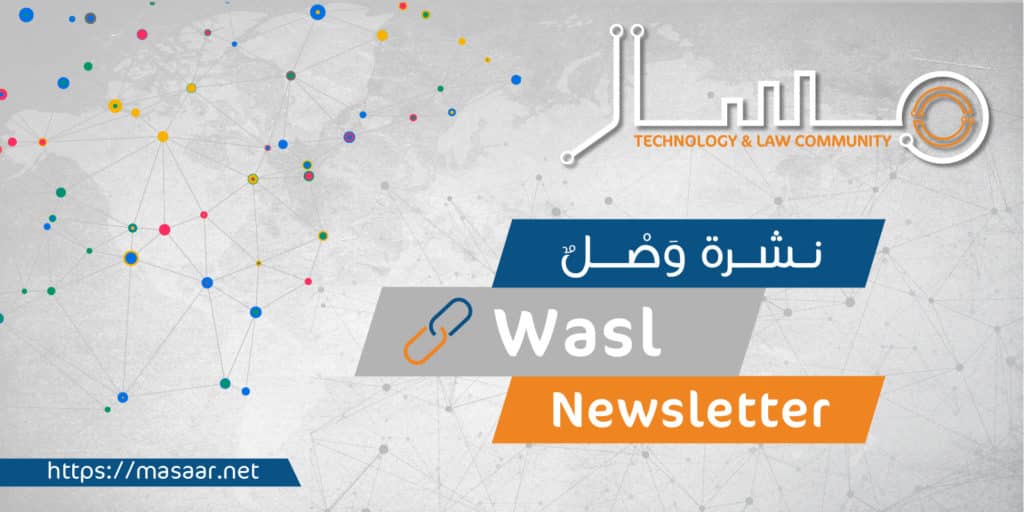
Bread&Net Forum
Bread&Net 2020 forum will be held online from December 1 to 4, 2020. Technology and Law Community “Masaar” is one of the partners supporting the forum which is organized by Social Media Exchange – SMEX.
Bread&Net 2020 will be a safe virtual space that is open for all interested groups and people, enabling them to communicate, discuss and attempt to devise solutions for the challenges threatening digital security and digital rights in our region.
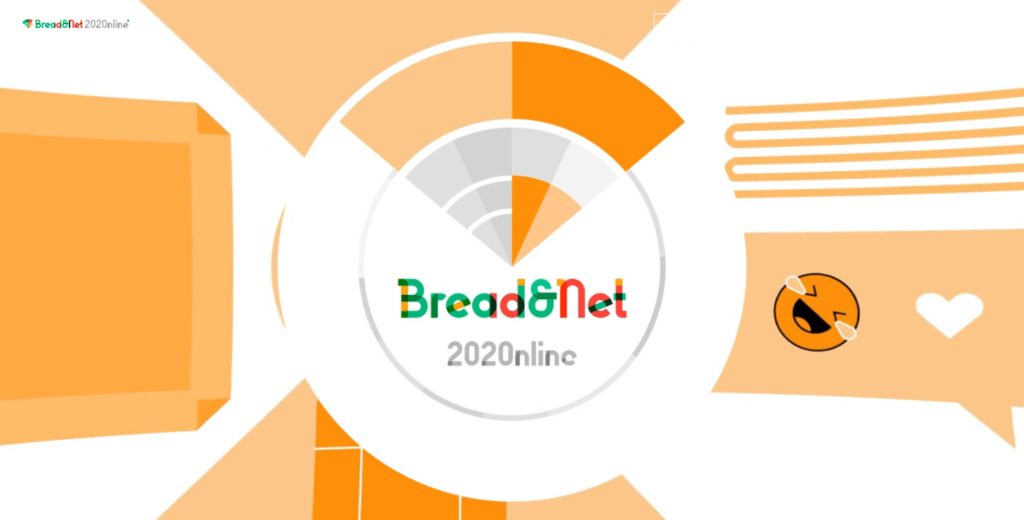
Bread&Net 2020 website | Link for registering in Bread&Net 2020 | SMEX website
Right to Privacy
Privacy in Instant Messaging Applications Guide
Masaar issued a technical guide on privacy and security options offered by the widespread instant messaging applications among users, the guide provided a detailed explanation of the following:
- Secure communication between individuals through instant messaging software and applications running on smartphones.
- Communication between groups through instant messaging software and applications that run on smartphones, including meetings.
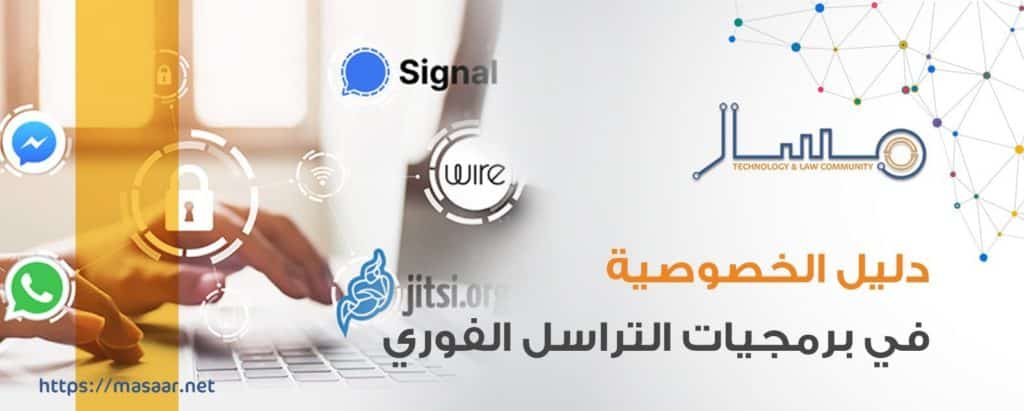
Link to the guide in English | Link to the guide in Arabic
- Offering technical knowledge related to the security and privacy options provided by popular instant messaging software and applications.
- General information brief about relevant laws and practices.
Egypt: Long History of Internet and Communications Surveillance
“Access Now” published an article on the practices of successive regimes in Egypt that aims to obtain spyware and monitor the Internet and communications. This article provides an account of spyware and surveillance software provided by private for-profit companies that have played a direct role in enabling and expanding censorship, espionage and repression in Egypt and the relevant legal texts found in Egyptian legislation.
Link for the article in Arabic
German-made FinSpy spyware found in Egypt
A report issued by Amnesty International’s Security Lab, revealed new developments on the Egyptian regime’s use of spyware and surveillance software to target activists and human rights defenders.
Amnesty International has discovered samples of FinSpy software, produced by the German company FinFisher Gmbh, and revealed its association with an attacker group known as “NilePhish”, which is responsible for the largest and unprecedented organized technical attack targeting civil society organizations, activists and human rights defenders in Egypt.
The report notes that the “NilePhish” Group used a fake update from Adobe Flash to download the FinSpy malware to target operating systems running GNU/Linux distributions, MacOS, Microsoft Windows, and Android.
Link for the report in English
Freedom of Expression on the Interner
Report: An Old Trial for a New Space
asaar released a report on the court ruling issued in the “Tik Tok Girls” case. The report begins with presenting data on the case, then proceeds to review the investigation procedures that included, interrogating the defendants and referring them to trial before the Cairo Economic Court after pressing charges against them. The report then proceeds to present the first judicial application of the crime of “assaulting Egyptian family values” stipulated under Article 25 of the Anti-Cybercrime Law.
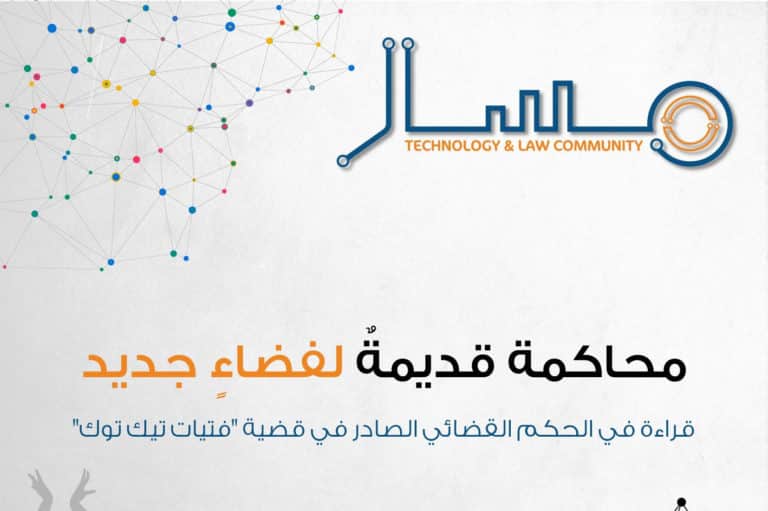
The report also proposes a different reading of the official narrative adopted by the investigation and trial authorities in interpreting the text of this article by reinterpreting the text in light of the parliamentary reports issued during drafting the Anti-Cybercrime law, and the case of the two girls Haneen Hossam and Mawada Eladhm are taken as a case study to understand this text.
The final section of the paper discusses the inconsistencies between the text of Article 25 of the Anti-Cybercrime law and the texts of the Egyptian Constitution.
Two years after the law was promulgated, the Cabinet issues the executive regulations for the Anti-Cybercrime law
On 27 August, the Egyptian Prime Minister issued the executive regulations for the Anti-Cybercrime Law, and the regulation included definitions to some of the terms mentioned in the law texts, such as encryption and the critical infrastructure, and it also regulated some provisions related to the obligations of the service providers with regard to the protocols used to encrypt data and information of various degrees, the regulation also stipulated the standards related to the registration of experts and technicians who are assigned by the investigation authorities or the judicial bodies.
Furthermore, the regulation mentioned a number of conditions related to the authenticity of the digital forensic evidence, and the procedures related to its extraction and preservation by the judicial officer, in addition to some procedures related to the technical security measures and precautions that every person responsible for administrating a website, a private account, or an e-mail adheres oblige to.
Sandvine in the Arab Region
Sandvine… The Surveillance Octopus in the Arab Region
Masaar released a report that reviews the activities of Sandvine; a company whose name has been in circulation in the past years for being active in the field of developing, manufacturing and operating software and equipment used by governments as tools for internet surveillance. The report also monitors a number of deals concluded by this company with Arab governments and companies, which represent a threat to the freedom of expression, the free flow of information, and the right to privacy.
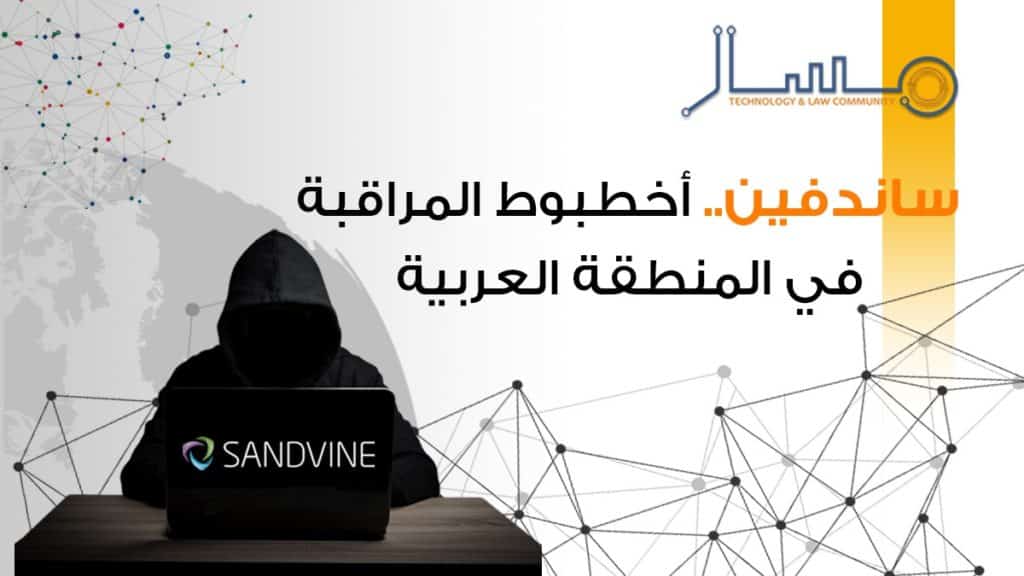
Press and Human Rights Websites Blocked in Egypt Using Sandvine Equipment
Masaar documented -technically- the blocking of press and human rights websites by Sandvine equipment, as Masaar conducted a series of tests on a sample of blocked websites in Egypt, with the aim of detecting the use of Sandvine equipment to block these websites. Masaar found that 15 of the 20 websites _a test sample_ had been blocked by Sandvine equipment.
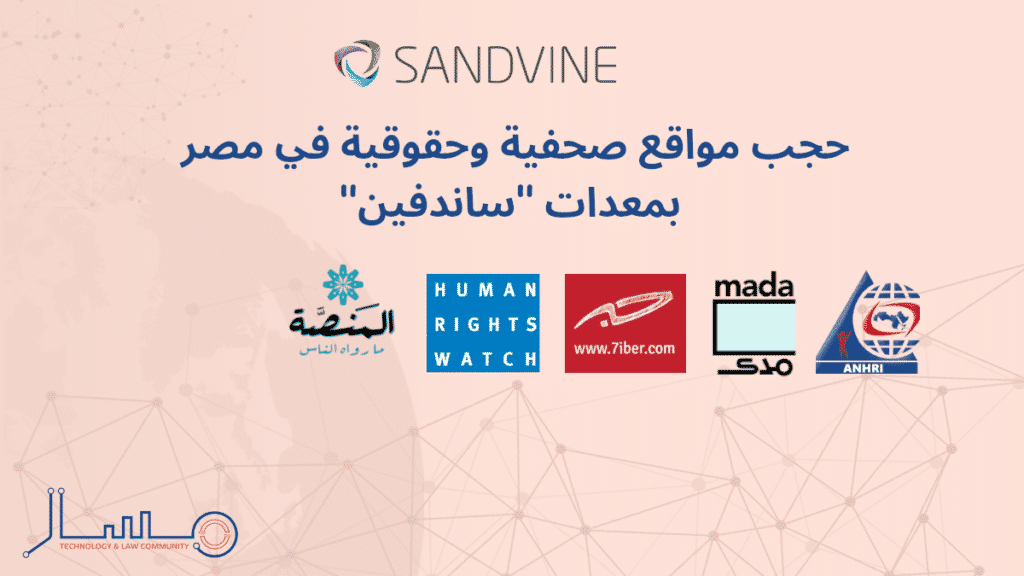
Link for the documentation: in English | in Arabic
Masaar conducted these tests on the Internet service provided by WE network (AS8452), formerly known as TE Data, which is operated by Telecom Egypt, and the Egyptian government owns 80% of its shares.
How operators use Sandvine to block independent media in Egypt
An investigation by Qurium Foundation with Al Manassa, an Egyptian independent news website, revealed the use of Sandvine equipment in Egypt to block websites and the presence of Deep Packet Inspection technology (DPI) in the infrastructure of some internet and communication service providers in Egypt.
This technology provides the Internet Service Provides with the ability to obtain many information about the behavior of users in addition to the ability to prevent or tamper with the connection or to exercise surveillance, especially if the connection is not encrypted.
Link for the investigation in English
Internet Censorship
Stop the Block Campaign
Masaar in collaboration with the Arabic Network for Human Rights Information (ANHRI) launched a campaign to demand lifting of the ban on websites and combat Internet censorship in Egypt and to support the public’s right to access knowledge, the freedom of digital media and the circulation of information, in light of the authorities’ control over most of the visual, audio, written and digital media.
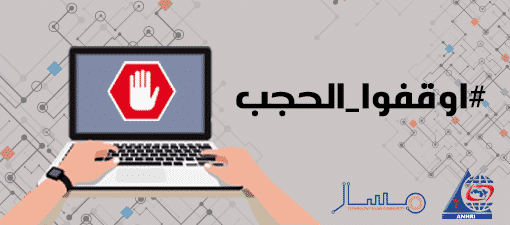
The two organizations also launched the campaign to demand the public to pressurize the Egyptian authorities to lift the ban on websites and stop censoring the Internet.
During the “Stop the Block” campaign, the two organizations conducted a set of activities, such as publishing a list of websites that have been blocked in Egypt during the past three years and sending letters to: the UN Special Rapporteur on the Promotion and Protection of the Right to Freedom of Opinion and Expression, the Special Rapporteur on the Situation of Human Rights Defenders, the United Nations Educational, Scientific and Cultural Organization “UNESCO”, the National Telecom Regulatory Authority (NTRA) and the Supreme Council for Media Regulation (SCMR).
List of blocked websites in Egypt
Masaar developed a web page that contains a list websites that have been blocked in Egypt during the past three years.
The page contains 628 URLs that were blocked in Egypt, of which 596 websites, and 32 alternate domains that were used by the blocked websites to reach their audience instead of the URLs that were blocked. The blocked websites include: 116 press and media websites, 349 websites that provide services to bypass the blocking (Proxy and VPN), and 15 websites that deal with human rights issues.
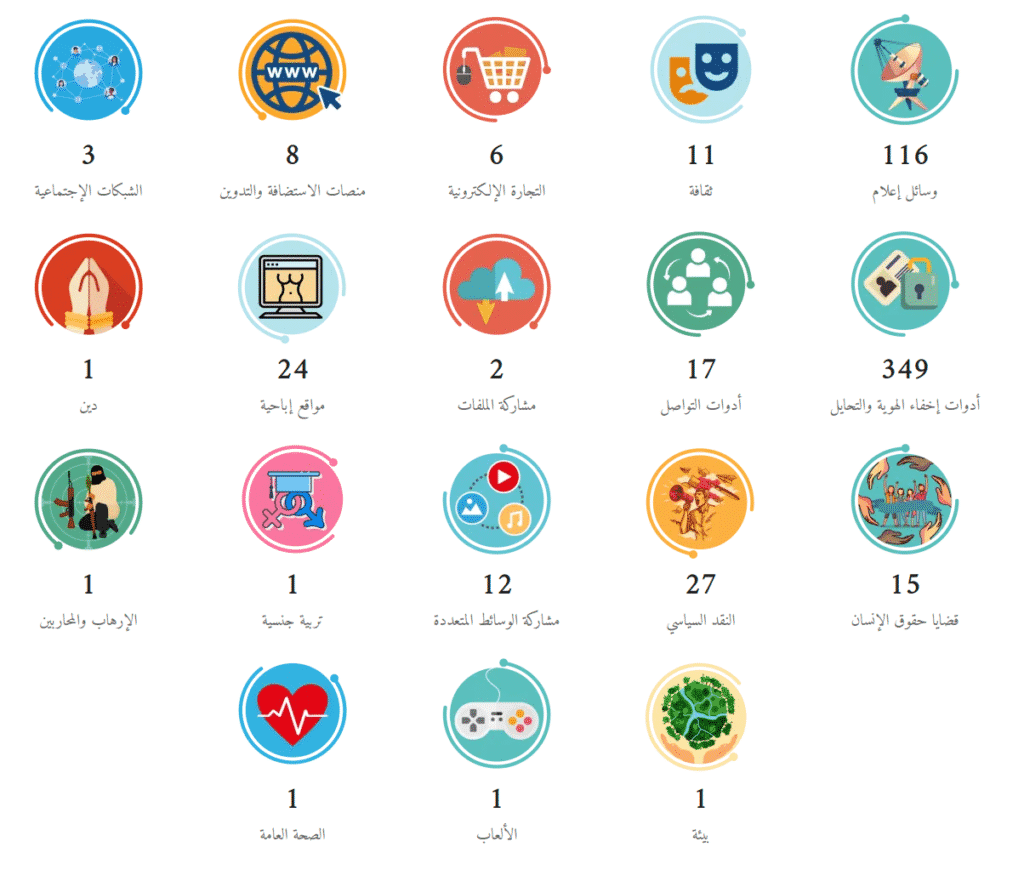
a List of blocked websites in Egypt in English | List of blocked websites in Egypt in Arabic
29 international human rights organizations call on Egypt’s government to end Internet censorship and website blocking
As part of “Stop the Block” campaign, 29 human rights organizations from different countries issued a statement calling on Egypt’s government for the following:
- End its policy of website blocking and lift all existing blockages on websites.
- Declare the legal basis of its actions in blocking more than 600 websites in the previous three years.
- Annul the right of the Supreme Council for Media Regulation to block websites that provide press media or human rights content, as it runs in contradiction to the Constitution and violates citizens right to access information.
- Repeal the Articles of the ‘Press and Media Regulation law,’ and the ‘Cybercrime’ law that give the state the authority to block websites on the basis of vague accusations.
- Stop purchasing and using surveillance and censorship equipment that are used to restrict freedoms on the Internet.
Link for the statement in English | Link for the statement in Arabic
Egyptian authorities block “Telegram”
“Masaar” documented the blocking of Telegram website and application by the Egyptian authorities on 22 October 2020. The authorities blocked Telegram on three of the Internet service providers operating in Egypt which are “We”, “Vodafone” and “Orange”. Masaar learned about the blocking action after complaints from several users of the Internet services on the three networks, stating that they cannot access the application or the website. It should be noted that Telegram is one of the most popular and widespread encrypted chat applications in the world.
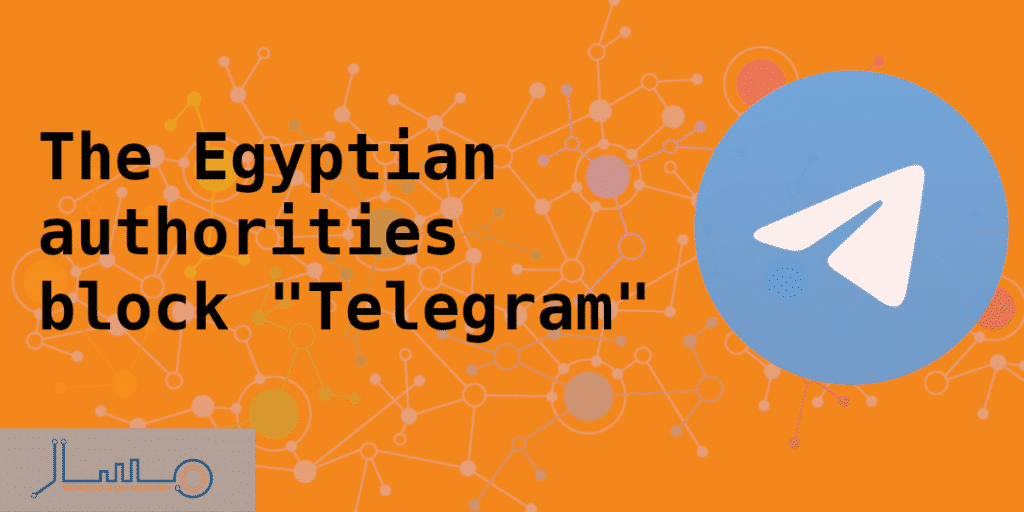
Link for the documentation in English | Link for the documentation in Arabic
Introducing Icarus Project
An online repository for documented Internet censorship circumvention techniques and methods. While the Icarus Project aim to document and facilitate the usability of different user-side circumvention solutions such as Tor, and various VPN protocols, their main focus will be at publishers-side approaches.
There are many reasons behind this approach:
- User-side circumvention tools are often easy to be blocked or throttled.
- Circumventing the block of user-side circumvention tools can be complicated process for non-technical users
- Publishers often lose big chunk of their non-technical audience
- In some environments, installing circumvention tools i.e. Tor, VPN could be incriminating and dangerous
Website Blocking in the Arab Region: Monitoring and Counteraction Techniques
SMEX published an article on monitoring and counteraction techniques of Internet censorship in the Arab region. The article presents a set of technical tools that can help overcome blocking and monitor and document censorship events in countries that practice blocking.
The article also presents some of the most important organizations promoting digital rights and countering Internet censorship.
Link for the article in English | Link for the article in Arabic
